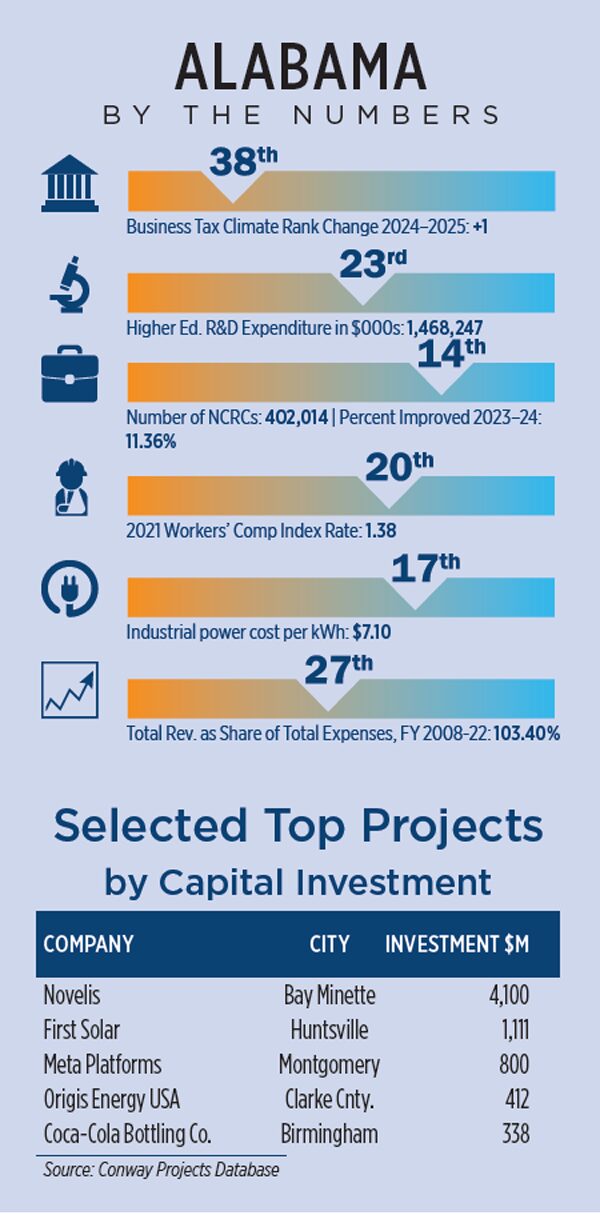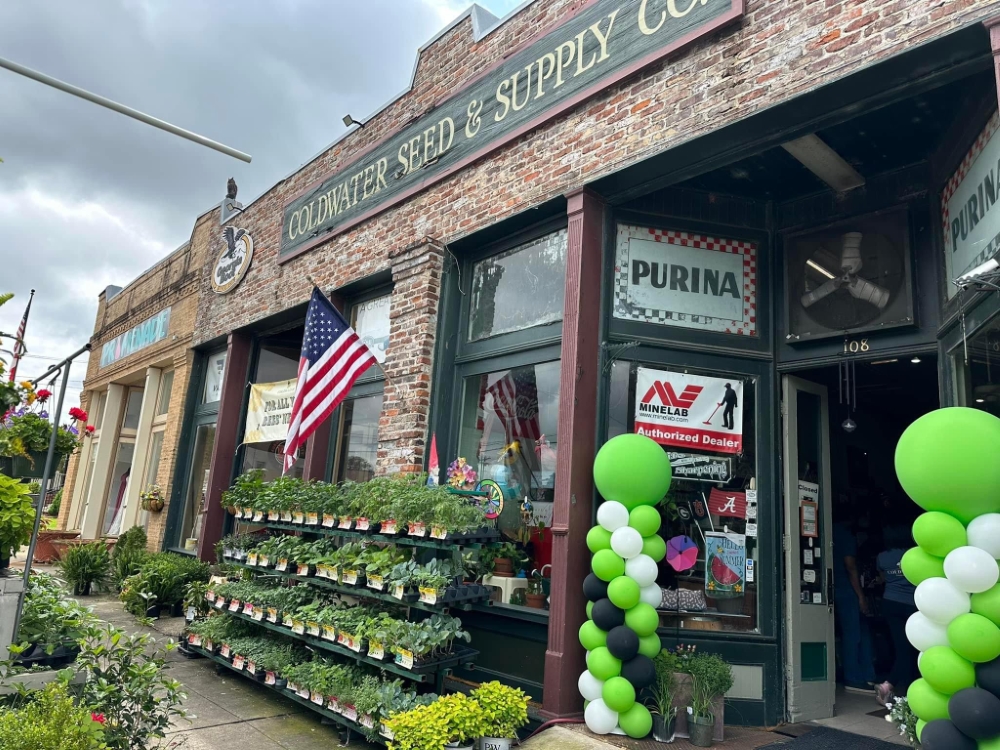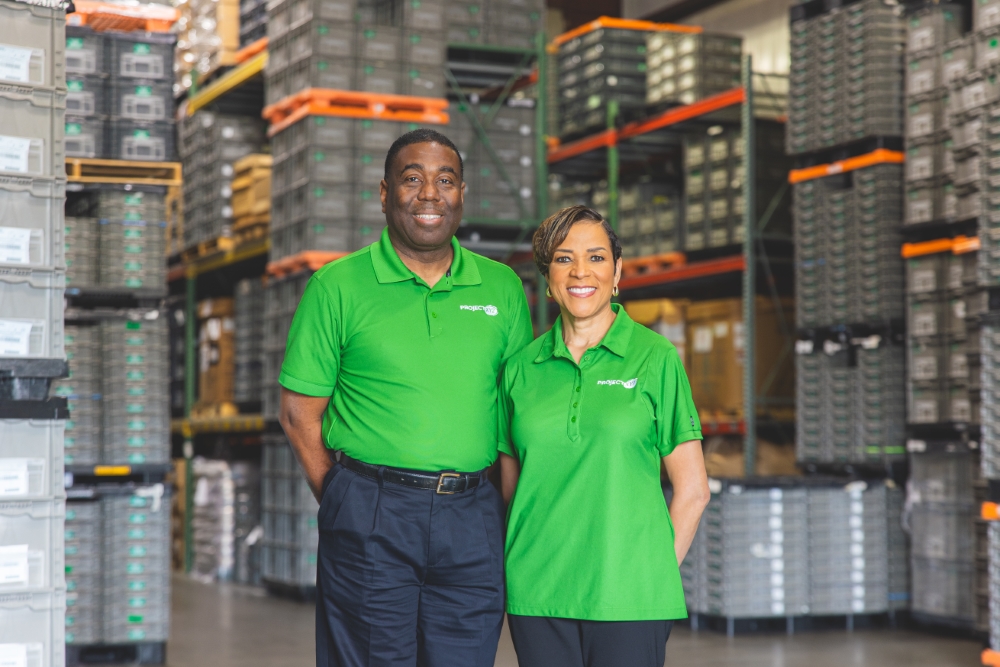Fueled by a potent blend of business sense, proactivity and community pride, Larry and Kim Lewis are a power couple with purpose.
Five years ago, on a self-assigned, self-guided industrial development and civil rights history driving tour through Alabama, I met Kim Caudle Lewis and her husband Larry Lewis. Natives of Huntsville and Tuscumbia who both matriculated at Alabama higher education institutions, they are business leaders, entrepreneurs and economic development champions for Huntsville and all of northern Alabama.
Before I knew it, instead of driving toward my next stop in Birmingham, I was headed west from Huntsville to Larry’s hometown of Tuscumbia in the Muscle Shoals region. I had lunch with the Lewises at their newly opened Superhero Chefs restaurant downtown presided over by Darnell Ferguson, a chef from Louisville who’d made a name for himself on the Food Network and who’s since opened another Superhero Chefs in Huntsville, where you can tuck into a plate of Southern Egg Rolls (yes, that’s mac and cheese in there) or a Sabertooth Burger.

The restaurant was not the only property the Lewises were looking at in Tuscumbia. An old movie theater across the street from the restaurant had potential. A seed and supply store Larry used to go to with his family held promise.
The Lewises’ enterprises today include ProjectXYZ, a technical engineering and manufacturing solutions provider whose growth and workforce development outreach continue in the Huntsville and in the Muscle Shoals region. They have other irons in the fire too, in such arenas as broadcast TV, logistics, alternative energy and yes, that seed and feed store.
“We now own the oldest seed and supply store in the state,” Larry says of Coldwater Seed and Supply, which originally located in downtown Tuscumbia in 1921 and draws its name from the Coldwater Creek that flows into the Tennessee River at Muscle Shoals. “We are owner number six. At the opening celebration we had the former owner or a representative of the owner’s family from all six families.
“So we are truly diverse, from a seed store to selling missiles,” he says, referring to the international defense portion of ProjectXYZ’s business. “Luckily the defense business is good to augment some of the challenges with the nostalgia.”
The Lewises’ work with Downtown Tuscumbia Inc. and Opportunity Alabama figures to help improve the downtown refresh, as does a potential affiliation with the Main Street revitalization program. “Now we’re going to do a community bank,” says Larry, who sits on the Opportunity Alabama board as well as the Shoals EDA board.
Manufacturing? Sure.
In January 2020, the Lewises were in their office talking about plans for the year when they got a call from the Shoals Economic Development Authority to gauge their interest in investing in an automotive operation in town, CBC INGS America, LLC. The Japanese company was looking to get out of the space, but Shoals area leaders didn’t want to lose those jobs.
“We closed around the Fourth of July and took over,” Larry says. “It’s primarily a plastic injection molding facility focused on lighting components and metallization [e.g. making the inside of that plastic-lined headlight structure look like metal]. We took over and saved about 140 jobs. We’ve now grown close to 200 people and we’ve expanded our customer base.”
That includes work for other automotive companies. “We have also designed our own product called Wire-Ups, a tool for hunters that allows you to cross barbed-wire fences,” Larry Lewis says of a product that has proved popular with law enforcement agencies too. In a statement that seems to reflect a pattern, Larry says, “I didn’t know that was a thing until someone came to me and wanted to make it out of plastic.”
ProjectXYZ employs nearly 130 on the defense side, which is the Lewises’ biggest revenue driver, driving between $35 million and $40 million of the company’s $54 million in revenue in 2023. “We sell weapons systems we don’t use to foreign military partners,” Larry says, noting the Hawk missile is being used extensively in Ukraine. “We have 10 employees in Poland who talk to the Ukraine military just about every day. We have helped the Army refurbish those systems and get them shipped from our facility in El Paso, Texas.” For the Chaparral system, Egypt is the biggest user.
ProjectXYZ’s footprint includes a corporate headquarters in Huntsville, an older 38,500-sq.-ft. manufacturing facility primarily used for logistics and another 20,000-sq.-ft. facility behind it. Another facility is the BizTech incubator with around 10,000 sq. ft. of engineering and lab space and then workspace for startups and non-profits.
“The atmosphere here makes it easier to do those things,” Kim Caudle Lewis says, noting the catalytic effect of Redstone Arsenal and its ecosystem of government contracts. “The community invites it because you have tons of engineers, the highest level of PhDs and a lot of creative thinkers looking outside the box. There are a lot of companies in town that are offshoots from entrepreneurs within other companies, based on individuals’ intellectual property. The area encourages that mindset: People can have a full-time job but also start their hobbies which turn into businesses later.”
Larry Lewis says Huntsville is progressive, but hasn’t always had access to investors and private equity capital. That used to mean under-capitalized startups would move to Austin or Silicon Valley to gain that access. “What made Huntsville thrive was doubling back down on defense,” he says, with federal dollars driving the growth of the area’s Inc. 5000 companies. Site Selection analysis showed Huntsville was home to 18 of Alabama’s 45 Inc. 5000 companies in 2024 (Birmingham had 15), good enough to rank the metro area No. 49 in the nation.
Alma Mater Ambitions
The future also means future workforce. The Lewises are on top of that too, via ongoing work with two- and four-year colleges and via the company’s workforce development program through Larry’s alma mater Deshler High School.
“Nobody on our side of the river had any students,” he says, so he went to Deshler, where he serves on the career tech advisory board, and found two students looking for jobs. “They told some other students, and six students showed up. That first year, we had close to 15 students, all word of mouth,” he says. “Over the past three years, we’ve built up our infrastructure. We hired a student coordinator. We have brought in tons of students from all of the high schools just to show and tell … We’ve slowed down intentionally this year so we can manage the program. We are writing a proposal right now to the State of Alabama for additive manufacturing to train student in 3D printing,” and more soft skills programming is in the works.
Competing with extra-curricular activities and studies makes it hard to get hours so the company moved to a Saturday shift. “It makes us more competitive with the McDonald’s and Lowe’s,” Larry Lewis says. “They can pick up a significant amount of hours, and it gives us more opportunity to pour more into them. We can spend more time training and talking with them differently.”

Photo courtesy of Larry Lewis and Kim Caudle Lewis
The homegrown program may dovetail with the new Alabama Workforce Pathways Act passed last year to offer the option of science and math credits for high school career and tech programs.
“The State of Alabama is being a little innovative with some of the grants they’re putting out for workforce development and entrepreneurship,” says Kim Caudle Lewis. “Some of the programs are geared toward rural areas, minorities and women. When DEI is under attack, for the State of Alabama to continue this is very progressive.”
Larry Lewis says career and technical education can be a tool or pathway out of the poverty that still persists in some rural communities and small towns. “If we can catch them early, put them inside where they’ve got a job and can earn money, they can see there’s another way out of the circumstance,” he says.
“Right now I may pay more for someone with a mechanical or technical degree than someone with a BS,” says Kim Caudle Lewis, whose associate’s degree from Calhoun Community College helped her get a start in health care IT. “I can show you can have an associate’s degree and nothing else. It’s one of the reasons we try to tell our story, to show it’s doable and attainable.”
The ProjectXYZ program with Deshler has 10 to 12 students now. But there are four cities and two counties in the Shoals, and nearly all of the high schools plan to bring their students by the operation. Lewis anticipates adding 10 to 15 students for next school year. “For 2025-26,” he says, “we intend to be at 40 students.”
“Larry and Kim Lewis of Project XYZ have made a remarkable impact on the Shoals area, supporting economic growth and community development through their visionary efforts,” says Shoals EDA President Kevin Jackson. He says their expertise and devotion to the region have “fostered a sense of optimism, encouraging both entrepreneurs and established businesses to invest in the future of the Shoals. Their work continues to inspire positive change, boosting both the local economy and the overall quality of life for residents.”

